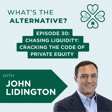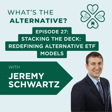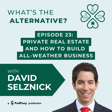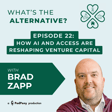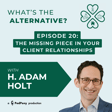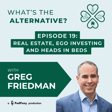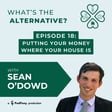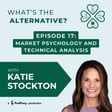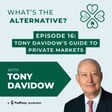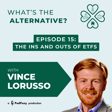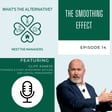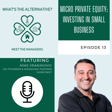
What's the Alternative? | Episode 12 | Be The Bank: Real Estate Debt Investing with Ben Lyons
Welcome to Banrion Capital Management’s What’s the Alternative Podcast! Join host Shana Orczyk Sissel, the “Queen of Alternatives” Founder & CEO of Banrion Capital Management, as she interviews leaders in the alternative investment space. Learn more about their firms, their passions and about the many different ways investors can use alternative investments to add value in their investment portfolios.
In this episode Shana sits down with Ben Lyons, Founder & Managing Director at LYNK Capital, to dive in to his passion for Real Estate investing.
In his 37-year career, the Managing Director of LYNK Capital, Ben Lyons, has learned a lot about real estate and investing. As a financial advisor, investor, and business owner, he has experienced his share of highs and lows, starting with modest roots in a middle-class family in Baltimore, MD. It was a chance encounter at an early age with a local real estate agent that formed the foundation for a career in real estate.
By the age of 25, he owned 100 rental properties and had a million-dollar lending business.
The beginnings, as they say, were humble. Originally planning for a future in community college, he instead went to work for a real estate company at the age of 18 for free. Determined to learn all he could about the business, he convinced his boss to place an ad in the money-to-lend section of the newspaper – he would work all the leads and split the profits with his boss 50/50. In January 1985, he collected over $10,000 in mortgage broker fee revenue, receiving $5,000 after the split.
“In one month, I went from earning $600 a month to $5,000. I thought I was rich. It was extremely exciting and only increased my motivation to learn and grow.”
After that, he read everything he could get his hands on and took mentors to lunch or dinner to learn what they knew. By the age of 21, he became the youngest licensed mortgage broker in Maryland and that year purchased a four-bedroom, two-bath home with a pool. His friends moved in and paid rent – becoming his first investment property.
Since that time, he has owned or managed over 375 residential and commercial real estate projects – and his lending organizations have produced more than $6.5 billion in mortgages. (He was previously an initial investor and large shareholder of a commercial bank, a title company, and three mortgage banks.)
His interests in real estate and financial freedom have produced some interesting insights – after decades of talking to hundreds of investors (many of whom are financially wealthy), he noticed that while everyone’s path to wealth was different, they all shared four things in common:
- They created predictable and scalable monthly investable income to reinvest for growth.
- They acquired assets, including stocks and real estate, for long-term growth.
- They learned how to leverage people, money, and knowledge to accelerate their success.
- They learned how to utilize time effectively.
It is on these principles that Ben believes anyone can find their path to financial freedom. He has recently authored his second book – this one in partnership with Ortus Academy, a financial literacy training company – to share his personal journey and financial formula for success. The book, titled From Worry to Wealth, is available for purchase and download.
“One of my favorite things is sharing my financial journey with others. There are several factors to determine financial success: our attitude about money and our education, which is not necessarily a college degree. Wealth is available to everyone. By understanding the components of wealth creation and applying them to your unique circumstances, you can build your own future, starting today.”
Learn More About LYNK Capital:
